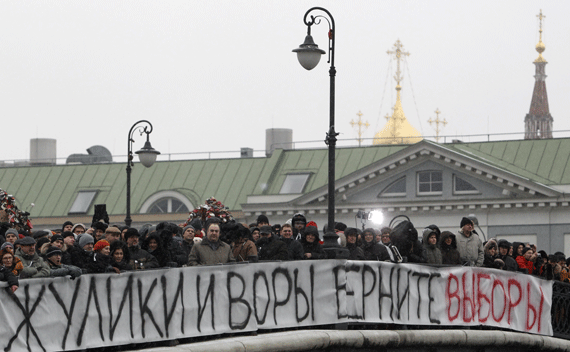Guest Post: Anya Schmemann on Russia’s Protests

When Vladimir Putin announced earlier this year that he would seek to return to the Russian presidency, everyone assumed his election would be a coronation. “Not so fast my friend,” as the esteemed philosopher Lee Corso likes to say. Tens of thousands of Russians have taken to the streets in recent weeks to protest the rigging of the December 4 parliamentary elections, suggesting that Putin may no longer be dominating Russian politics as he once did. I asked my colleague Anya Schmemann, who spent most of her childhood in Russia, to give me her perspective on what is happening. Here is what she had to say:
The day after the Russian parliamentary elections on December 5, a friend in Russia posted excitedly on Facebook from the scene of a large demonstration in Moscow.
“Chants of "Russia without Putin!" "Putin is a thief!" "Revolution!" and calls for a Russian Tahir Square. Something is going to happen. It already is.”
Comments started pouring in – “Slavic Spring!” “Occupy the Kremlin!” “The Bear Awakes!”
Videos of officials surreptitiously filling in ballots went viral. Scenes of that first demonstration, not shown on Russian TV, were quickly circulated on the internet.
The mood in Russia – and here, among Russia watchers – is giddy, incredulous, and hopeful.
It’s hard not to be moved by the sight of thousands of Russians taking to the streets to protest. It’s hard not to be excited by the prospect of positive change in a country that has borne its share of tragedy.
“The emperor has no clothes!” “The tide has turned!” – our friends declared on Facebook.
It’s hard not to be enthused by their optimism and encouraged by the peaceful and determined response of the Russian people to make their discontent known.
But is the hopefulness warranted? Will Russia – can Russia – really change?
Vladimir Putin’s announcement that he planned to be Russia’s president again and his subsequent effort to pad his party’s results at the ballot box were brazen and insulting. The leadership is now making efforts to placate the opposition by acceding to some of their demands.
But while the presidential election in March may not be the cakewalk that Putin expected (he may, indeed, be forced into a runoff if he cannot muster 50% in the first round) – it is likely that the parliamentary results will stand and that Putin will become president again.
As the cold weather sets in, the crowds will thin and the sense of unity will fray. Putin will turn to his well-greased political machine to stifle dissent, muzzle the opposition, control the media, and – in the end – deliver the votes he needs. “Things will be as they always were,” as the Russian saying dourly proclaims.
It’s hard not to be cynical about positive change in Russia when it has so often been promised and so seldom delivered.
But it’s the holiday season and one cannot be entirely cynical at this time of year. One cannot ignore the rays of light shining thinly through Russia’s dark winter.
Urban, upwardly-mobile Muscovites, who have been largely silent up to now, may be emboldened by their new-found voice. The demonstrations (the next scheduled for December 24) may gather momentum and average Russians may feel more and more empowered.
I witnessed the transformations in Russia twenty years ago and the economic chaos that followed. Our Russian friends do not want to return to those uncertain days. But they may decide they can’t stomach the current regime for another twelve years.
Most importantly, Putin’s aura of invincibility and inevitability has been punctured, perhaps irrevocably. He is now making an effort to show that he is listening. Perhaps he will bring some new humility to his role as leader.
Perhaps.
 Online Store
Online Store